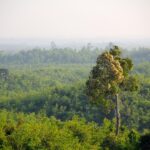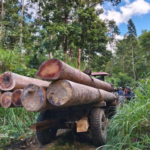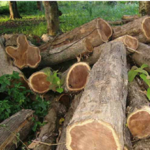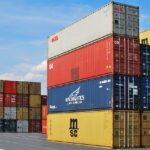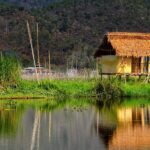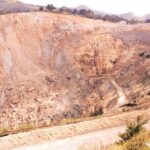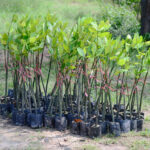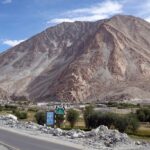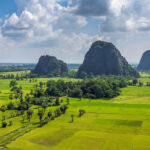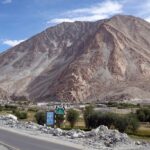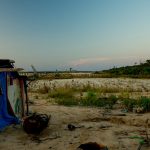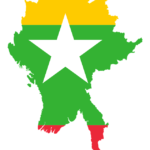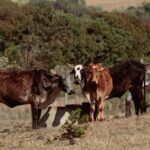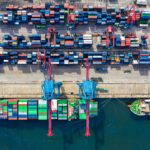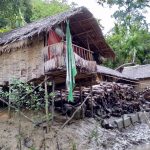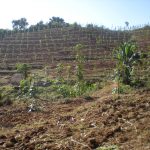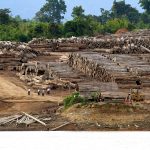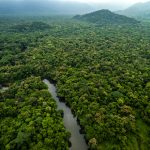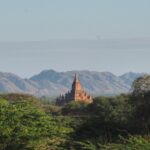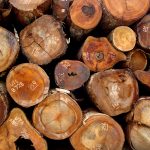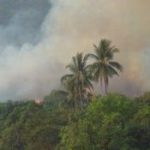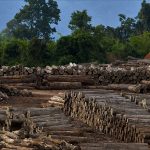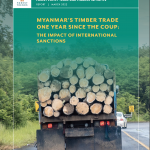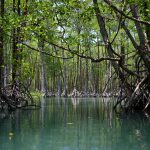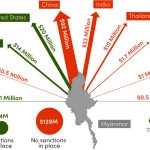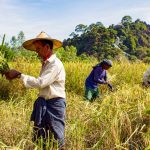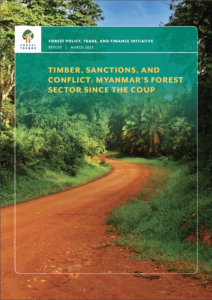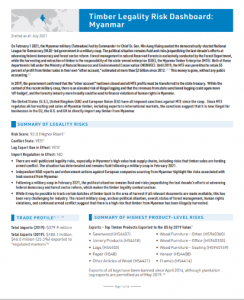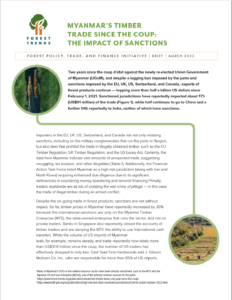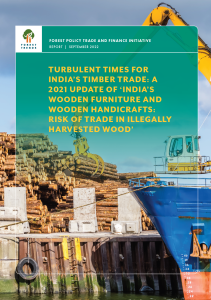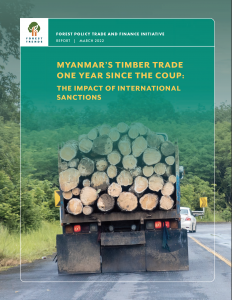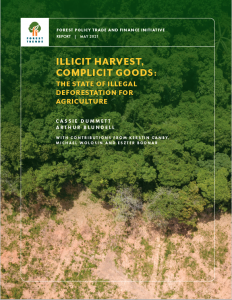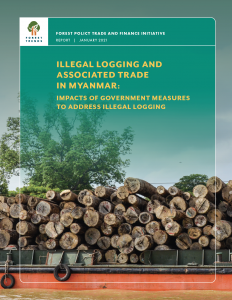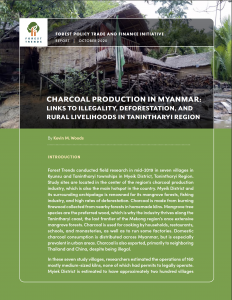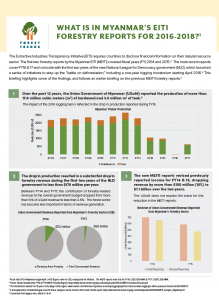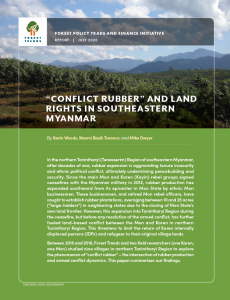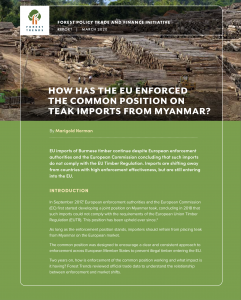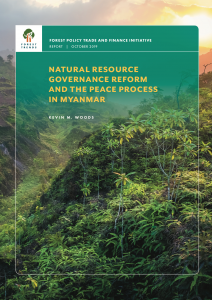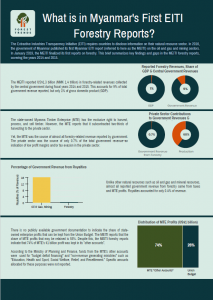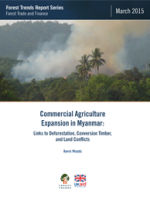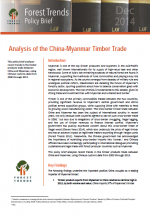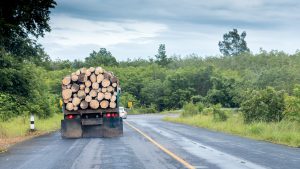
On February 1, 2021, the Myanmar military (Tatmadaw) led by Commander-in-Chief Sr. Gen. Min Aung Hlaing ousted the democratically-elected National League for Democracy (NLD)-led government in a military coup. The political situation remains fluid and risks jeopardizing the last decade’s efforts at advancing federal democracy and forest sector reform. Forest management in natural Reserved Forests is exclusively conducted by the Forest Department, while the harvesting and extraction of timber is the responsibility of the state-owned enterprise (SOE), the Myanma Timber Enterprise (MTE). Both of these departments fall under the Ministry of Natural Resources and Environmental Conservation (MONREC). Until 2019, the MTE was permitted to retain 55 percent of profit from timber sales in their own “other account,” estimated at more than $2 billion since 2012. This money is gone, without any public accounting.
In 2019, the government confirmed that the “other account” had been closed and all MTE profits must be transferred to the state treasury. Within the context of the recent military coup, there is an elevated risk of illegal logging and that the revenues from state sanctioned logging could again move ‘off-budget’, and the forestry industry more broadly could be used to finance violations of human rights in Myanmar.
In response to the coup, the US, EU, UK, Switzerland, and Canada passed sanctions on entities involved in the Myanmar forestry sector that effectively constitute a ban on all trade in timber products. All five markets do not prohibit the trade in timber directly. Rather, they have sanctioned the MTE. Because the MTE is the only source of legal timber in Myanmar, sanctions on the MTE are a de facto ban on any trade in Myanmar timber. All have also sanctioned military-linked conglomerates, including the Myanmar Economic Corporation (MEC) and its subsidiaries, thus prohibiting the use of the MEC-owned port of Alhone (Yangon). The EU and Switzerland have also sanctioned the Forest Products Joint Venture Corporation Ltd. (FPJVC), which is majority government owned. The UK and Canadian sanctions regimes also require businesses operating in the UK or Canada (regardless of the business’ own nationality) to conduct due diligence to ensure that they are not violating sanctions.
- There are well-publicized legality risks, especially in Myanmar’s high value teak supply chains, including risks that timber sales are funding armed conflict. The situation has deteriorated and remains fluid following a military coup in February 2021.
- Independent NGO reports and enforcement actions against European companies sourcing from Myanmar highlight the risks associated with teak sourced from Myanmar.
- Following a military coup in February 2021, the political situation risks jeopardizing the last decade’s efforts at advancing federal democracy and forest sector reform, which makes the timber legality context unclear.
- While it may be possible to track certain batches of timber back to the area of harvest if all relevant documents are made available, this has been very challenging for industry. The recent military coup, unclear political situation, overall status of forest management, human rights violations, and continued armed conflict suggest that there is a high risk that timber from Myanmar has been illegally harvested.
Read more by downloading the Myanmar Timber Legality Risk Dashboard here.
The National Assembly’s Standing Committee on Human Rights was given a grim briefing on human trafficking on Tuesday, revealing that around 10,000 Pakistanis are currently trapped in the forests of Cambodia and Burma. These victims of organized human trafficking networks are reportedly being forced into illegal logging, agricultural labour, and drug trafficking.
The security forces have seized 610 tons of “illegally transported” timber worth Rs 3.10 crore in Manipur’s Tengnoupal district, adjoining Myanmar, officials said on Monday. A defence spokesman said the illegally procured timber was carried in 61 trucks, and the vehicles have also been confiscated under the Motor Vehicles Act, 2019 and the Manipur Forest Rules, 2021.
A police official separately said that the police, in coordination with the Forest Department officials, are conducting a probe to ascertain the origin of the huge consignment and where these was intended to be delivered. Police are also trying to find out whether the timber was smuggled from neighbouring Myanmar, which shares a 398-km-long unfenced border with Manipur. The Union Ministry of Home Affairs had earlier decided that the entire 1,643 km porous India-Myanmar borders with four northeastern states — Manipur, Mizoram, Arunachal Pradesh and Nagaland — known for the smuggling of arms, ammunition and narcotics, would be fenced at a cost of Rs 31,000 crore.
Companies across the Association of Southeast Asian Nations (ASEAN) region are supplying Myanmar’s military regime with revenue, technology, and aviation fuel to sustain its ongoing nationwide terror campaigns, including air and artillery strikes against its own people, according to Justice For Myanmar (JFM).
Singapore’s Greenply Alkemal, Natural Forest, and Valency International exported $12 million in timber via Myanma Timber Enterprise (MTE) from 2021 to 2023, in the face of US, EU, and UK sanctions. Natural Forest used junta-owned ships, directly enriching the junta’s Myanma Economic Holdings Limited (MEHL).
The teak trees of the Bago Yoma mountain range have long been a target for illegal logging, but the practice has intensified amid the post-coup chaos, with the involvement of both junta and resistance forces.
The mountains are now contested by a patchwork of armed forces, including regime troops and about a dozen People’s Defence Force battalions operating under the National Unity Government, a parallel administration appointed by elected lawmakers deposed in the coup. With law enforcement largely absent in the region, both sides seem to be involved in plundering and profiting from the forest’s resources.
The sale of hardwoods and other highly valued forest products is a major source of hard currency for the regime.
arlier in March, MTE published a yearly schedule of monthly tenders starting April 2. In a separate announcement, it invited bids for 301 tonnes of teak logs, 57 cubic metres of teak boards and other processed material, and 161 tonnes of ironwood, all from locations in Yangon.
Despite EU sanctions banning the import of Myanmar teak since 2021, Poland has continued to receive shipments of the sought-after wood, often used for luxury furniture and yacht construction. According to data from the Polish Central Statistical Office, the country imported over $11.5 million worth of Myanmar timber between 2021 and 2024.
FSC and Assurance Services International (ASI) announce the launch of the Teak Corridor transaction verification (TV) loop. FSC and ASI have conducted TV loops on FSC-certified high-value timber species like teak (Tectona grandis) in the past. The previous teak TV loop, along with other available information, indicate the possibility of integrity risks in the segregation of FSC-certified and non-certified teak in the supply chains.
Therefore, FSC recommends certificate holders with teak in their certification scope to apply additional due diligence in selecting their teak suppliers and following FSC rules to ensure that the teak products they purchase are legitimate and within the FSC certificate scope of the seller.
With the management of the Ayeyawady Region Illegal Trade Eradication Task Force, combined teams conducted inspections on 13, 14, and 15 February in Myanaung, Kyonpyaw, Maubin, and Pathein districts. They seized 9.664 tonnes of timber, estimated at K1.78 million, and are taking action in accordance with the Forest Law.
Tensions are rising along the Naf river border as the Arakan Army, a Myanmar rebel group, has seized another timber-laden trawler heading toward Teknaf Port.
Businessman Abdul Kader, an importer of the seized timber, said, “A boat carrying 35 tonnes of timber for me was taken by the Arakan Army while en route from Myanmar. I heard they are conducting a search, possibly due to false information. However, communication is ongoing with Myanmar’s traders and the rebel group. I have been informed that the boat will be released after inspection.”
In the volatile borders of Myanmar and Thailand, one name dominates in the corridors of power and the murky depths of illicit business: Saw Chit Thu. A master of defection and betrayal, he has navigated shifting alliances to build an empire in Myawaddy, controlling a network of economic and military interests that stretches across the borders.
This article tracese his evolution and control over Kawmoora and lucrative timber trade rights along the Moei River, particularly in Shwe Kokko village, which marked the beginning of his transformation from a guerrilla fighter to a power broker. Shwe Kokko, meanwhile, transformed from a timber and cattle trading hub to a casino town and scam centre, attracting Chinese investors relocating their operations from other regions.
Lawyers at ClientEarth say that despite clear regulations, the Polish authorities are not taking sufficient action to control imports and enforce bans on the wood.
According to the data from Poland’s Central Statistical Office, between 2021 and 2024, the total value of Myanmar’s wood and wood products imported to Poland was over EUR 11 million (PLN 47 million). Poland is not the only importer of Myanmar teak in Europe: Italy, Slovenia and Croatia also import significant volumes of the wood.
ClientEarth is appealing to Poland’s Chief Inspectorate of Environmental Protection to immediately carry out inspections of timber importers from Myanmar and to enforce penalties for companies violating the law. It also requests increased transparency in the monitoring of timber supply chains and better implementation of EU regulations in Poland.
Myanmar authorities have seized over 100 tonnes of illegal timber across the country in a week, the state-run daily Myanma Alinn reported on Tuesday (Jan 7). From Dec. 23 to 29, 2024, they confiscated over 5.64 tonnes of teak, over 19.75 tonnes of hardwood and over 135.8 tonnes of other types of timber in the country’s regions, states and Nay Pyi Taw Union Territory, the report said.
During this period, 17 offenders were charged in connection with the cases, along with the seizure of six vehicles and machines, it added.
On 2 January, teams under Magway Region Illegal Trade Eradication Task Force seized 0.712 tonne of illegal timber worth K119,779 in Konzaung Village of Pwintbyu Township. At Nyaungkhashay X-ray checkpoint in Bago Region, officials seized illegal foodstuffs worth K2.2 million carried by a King Long bus worth K20 million. Moreover, 200 tonnes of illegal charcoal, 1.409 tonnes of teak, 0.537 tonne of hardwood and 1.944 tonnes of other timber worth K2.23 million were confiscated in Bago, Nyauglebin and Thayawady districts.
Dutch prosecutors have fined the company that built Jeff Bezos’ $500 million superyacht after discovering that it had used teak wood from Myanmar in violation of European laws. On Nov. 26, the Netherlands Public Prosecution Service imposed a $157,000 fine on Oceanco.
Following a two-year investigation, prosecutors accused “a Dutch yacht builder” of failing to investigate the origin of the wood used in some of the yacht’s furniture and finishings, which was purchased from an unnamed Turkish woodworking company. Court documents also revealed that German timber merchant Alfred Neumann provided illegal teak on the vessel’s decks, and German authorities are now investigating the trader’s actions.
In its ruling, the court said, “Oceanco was the first to place the timber on the European market but could not conclusively verify whether the wood had been legally or illegally harvested.” It was this lack of traceability, rather than confirmed illegal sourcing that constituted a breach of the EUTR.
The latest prosecution comes just days after Sunseeker—the UK’s largest boatbuilder—was fined almost £360,000 for violating the post-Brexit United Kingdom Timber Regulation (UKTR). Thus, the prosecution highlights the challenges faced by an industry long marred by shadowy brokers—in Singapore, Thailand, and Turkey—profiteering from the sale of conflict timber infiltrating European supply chains.
The British boatbuilder has been fined over £350,000 in a landmark case in the UK courts for importing teak from Myanmar…
Sunseeker International has been fined £358,759.64 for 11 specific imports relating to ‘blood’ teak originating in Myanmar. Sunseeker’s charges included failing to exercise due diligence as an operator when placing timber products on the market, failing to maintain and evaluate a due diligence system for timber or timber products, and failing to comply with article 5(1) of the Commission Implementing Regulation (EU) No 607/201, which pertains to record-keeping obligations for operators.
During the court proceedings, it was revealed that Sunseeker’s timber imports included teak from Myanmar, wenge from Africa, and European oak, with a combined value of just over £60,000. However, although the Poole-based firm was sentenced only based on 11 specific imports, the court heard evidence suggesting there were many more. Judge Fuller noted that Sunseeker was aware of impending changes to timber import regulations after Brexit, which altered its status from ‘trader’ to ‘operator’ and subsequently left it in breach of the rules. He described the company’s failings as a “systemic failure”.
Also reported here: UK luxury yacht firm exposed by EIA the first to be sentenced for importing Myanmar ‘blood’ teak – EIA
Mining is one of the fastest growing causes of deforestation, with a new report published by the World Resources Institue (WRI) revealing that 1.4 million hectares of forests, an area the size of Montenegro, was lost to the extraction of coal, iron and industrial minerals for the 20 years to 2020.Since the turn of the century, mining has increased by 52%. This includes tropical primary rainforests, some of the world’s most important ecosystems where mining is a growing loss driver, and Indigenous and local community territories, where people depend on forests for their livelihoods.
More than 89% of the loss is concentrated in just 11 countries, including Indonesia, Brazil, Russia, the United States, Canada, Peru, Ghana, Suriname, Myanmar, Australia and Guyana.
A new ruling by the EU Court of Justice (CJEU) may partially undo earlier criminal convictions for importing teak from Myanmar in defiance of a previous EU sanctions regime.
The CJEU ruled on 5 September 2024 that teak taken from Myanmar and processed into sawn wood in Taiwan conferred Taiwanese origin. In contrast, teak logs that underwent “debranching and debarking” or were sawn into “wooden cuboids” did not undergo sufficient processing to change the teak’s Myanmar origin. The court also ruled that sanctions only covered goods “imported into the European Union directly from Burma/Myanmar”, although it also determined that in cases of serious doubt, Member States’ customs authorities are not prevented from requiring supplementary evidence when presented with origin certificates. This means a customs authority is not bound by a certificate of origin issued by a third country (in this case, Taiwan) when determining whether to investigate potential sanctions infringements.
EIA believes the CJEU ruling on changes to origin based on levels of timber processing in a third country goes against the spirit of both the EUTR and EUDR.
The Myanma Timber Enterprise (MTE) is allegedly working to open secret bank accounts at the Myanmar Economic Bank (MEB) weeks after the United States imposed sanctions on two banks with links to the military.
The Irrawaddy investigators allege that the MET, already sanctioned by the European Union, the United States and the UK, is working to use MEB bank accounts to bypass international financial sanctions. The publication alleges that “the secret bank account will be linked with banks in Singapore, Thailand, Japan, India and China for international transactions, with local banks used for domestic transactions.”
As Thailand inches forward on its decades-old vision for a “logistics corridor” connecting the Pacific and Indian oceans, local opposition and political instability threaten the plans. the proposed 90-km highway-rail link would cut across the Malay Peninsula, connecting a planned port facing the Indian Ocean in Ranong province with another port planned for the Chumphon province, along the Gulf of Thailand and with a lane to the Pacific Ocean. A special economic zone would be established nearby.
Thailand’s US $2 billion forest and forest products industries, both export and domestic, will benefit significantly from the new port. The bulk of domestic wood supply comes from plantation species such as teak and eucalyptus, but also wood derived as a by-product of agricultural processes, such as mango and durian wood. By far, the largest volume of this type of wood is rubber. Thailand is also a major timber importer from many countries, not only within the Asia-Pacific region but also from Africa, the EU and the Americas.
This is mainly processed into products that are exported again. The range of wood types and sources is broad and includes softwood from New Zealand and South America, high-quality species from Africa and the Pacific, and rubberwood and teak from Thailand’s neighbouring countries.
Justice for Myanmar (JFM) issued a press release dated 19 August accusing Singapore based company Emerging Towns & Cities (ETC) of continuing to fund the Myanmar military as it commits war crimes and crimes against humanity with total impunity.
ETC’s Myanmar partner, Jewellery Luck Group of Companies, and their owners and directors continue their business relationship with the Quarter Master General Office. Jewellery Luck Group of Companies also owns 30% of Golden Land Real Estate Development. The group also finances the junta through teak purchases from the junta-controlled Myanmar Timber Enterprise, according to Justice for Myanmar sources.
While seeking to wind down its timber operations in Myanmar, the global commodities giant Olam has exported more than a thousand tonnes of teak from the war-torn country since the junta seized power three years ago.
Olam-owned companies have reportedly played a role in exporting nearly 40 shipments of Myanmar teak worth more than US $2 million since the February 2021 military coup, according to leaked tax data and customs records examined by the UK-based journalism organisation Finance Uncovered for Myanmar Now.
These shipments took place after Olam Group’s chief executive publicly confirmed the company would exit Myanmar three months after the coup, as the country descended into a civil war that has seen thousands of civilians killed and millions driven. . .
The depletion of mangrove forests in Tanintharyi Region has constrained the illicit crossborder trade of charcoal into Thailand, even as prices remain high, but small-scale producers in Myanmar’s deep south have few other ways to make a living.
Myanmar charcoal accounts for more than two thirds of Thai imports of the commodity, with smaller quantities coming from Laos, Cambodia and Malaysia. While many households and businesses in Thailand have switched to cooking mostly with gas, using charcoal only for barbecues, Thai customs data suggests that almost 80 percent of charcoal imports are re-exported, to countries including China, Japan, Australia and Bahrain.
The smuggling of teak or more precisely Burmese teak wood (Tectona grandis) from Myanmar has become a significant issue, with reports of high-profile seizures and arrests across India. This has highlighted the scale and complexity of the problem in the East and Northeast India.
Recent incidents reveal the extensive network of smuggling routes and the lengths to which traffickers go to conceal their illegal activities. From hiding timber under coal sacks and bamboo to using false documentation, smugglers employ sophisticated methods to evade detection. The involvement of individuals from various states, including Haryana, Rajasthan, and Uttar Pradesh, highlights the widespread nature of this illegal trade. The continuous seizures and arrests reflect the ongoing efforts of law enforcement agencies to combat this menace. However, the persistence of smuggling activities indicates the need for more robust measures and international cooperation to curb the illegal trade of Burmese teak.
According to Eurostat, the EU’s statistical office, between June 2021 and December 2023, the EU imported more than €34 million worth of teak directly from Myanmar.[1]
Notably, total teak imports from Myanmar into the EU decreased from around €23.5 million in 2022 to just over €3.8 million in 2023. While this is a positive decrease in the trade, this figure should be at zero.

Teak decking on a sailing yacht
And does this tailing off of direct trade mean demand for teak has decreased? It is unlikely. EIA strongly believes that Burmese teak is being shipped into EU and US markets via other countries by traders who disguise the wood’s true origin to circumvent sanctions.
A prime example is that of neighbouring India, which has seen an increase of teak imports into the EU rise from a total figure of around €500,000 in 2021 to nearly €7.5 million in 2023, according to Eurostat.[2] Similar upward trends are seen for shipments to the US, according to the global trade database Panjiva.
On June 9, in Bago Region, inspection teams seized approximately 7.000 tons of illegal teak, 0.619 tons of hardwood, and 8.098 tons of other timber worth about 4,788,623 kyats in Bago District, Taungoo District, and Pyay District.
Myanmar is the most violent place in the world, ranking just above Syria and Palestine, according to data from the Armed Conflict Location and Event Data Project. Since the 2021 coup, the international community has imposed economic sanctions to restrict the military generals’ ability to enrich themselves from Myanmar’s natural resources and business ventures.
One strategy that the military employs is circumventing sanctions in order to sell timber to international buyers. According to its own reporting, Myanmar exported $235.6 million worth of timber between October 2021 and mid-2023. Actual production levels are likely much higher than official reports due to the prevalence of cross-border smuggling.
As much as 80 percent of timber leaving Myanmar is smuggled to India and China, according to research published in 2021 by the Global Initiative Against Transnational Organized Crime. The organization’s investigations show that smugglers often conceal logs in oil tankers and humanitarian vehicles, but in some cases, they operate out in the open.
The Irrawaddy River is a flashpoint for conflict timber, with more than 100 tons—and sometimes up to 300 tons—of teak and other species leaving Myanmar ports every week.
The teak is then traded into Western Markets (including Italy, teak’s entry point into the EU) via China, India and Indonesia, with proceeds used to fuel both sides of the conflict.
Yesterday, Mynamar officials announced that more than 1,600 tons of teak (more than 250 tonnes a week) had been confiscated over the past six weeks, in a major escalation in the trade across borders. And that is just the timber, deemed “illegal” by the junta-controlled government – with the hidden trade in teak booming amongst the junta’s allies.
Metals, silicon, and timber are among the resources from northern Shan State being exported to China through a gate reopened by the ethnic armed organisation in Namkham Township. Several other crossings remain contested or closed. The ethnic armed organisation’s customs department unveiled the post on April 29, although neither the TNLA nor China have released an official statement acknowledging the operations of the trading site.
Alittle bit of background information on Myhanmar – India border controls on timber trade: A statement by the Public Relations Officer, Headquarters IGAR (South) stated, ‘In the absence of the Free Movement Regime (FMR), any movement of any good including timber across the IMB is illegal.
Timber originating from Myanmar is subject to stringent regulations mandating passage through the Integrated Check Post, Moreh to fulfil custom duties.
Assam Rifles issued a rebuttal to allegations of harassment by local timber transporters, emphasizing compliance with regulations and their commitment to upholding directives from the Central and State government regarding border security and cross-border trade.
The European Union (EU) announced on 26 April 2024 that sanctions on organisations and people associated with the Myanmar junta would be extended for another year.
Amongst the organisations included on the EU sanctions list renewal are:
The military-owned Myanmar Economic Holdings Ltd. (MEHL), Myanmar Gems Enterprise, Myanmar Timber Enterprise, and the Veterans Organization, along with private companies such as Htoo Group, IGE Company, Asia Sun Group, Dynasty International Group, Royal Shune Lei and Sky Aviation Star Sapphire.
Myanmar Oil and Gas Enterprise (MOGE), No. 1 and 2 Mining Corporation, the Office of Adjutant General, Directorate of Defence Industries, Directorate of Military Procurement also had sanctions against them renewed.
Local people in Maw Luu, prevented from harvesting timber by an NUG ban, have protested by blocking logging trucks that the resistance administration team allowed to travel through the town based on a prior arrangement
Assam Rifles troops seized a significant amount of timber worth Rs 4.88 crore (about US$ 587,840) at the Manipur-Myanmar border. 50,603 cubic feet (CFT), is believed to have originated in Myanmar.
Following the military coup, rare earth mining has experienced a boom in Myanmar’s north-eastern region. The region is under the control of a Border Guard Force that falls under the military’s chain of command. There are approximately 2700 rare earth mining collection pools scattered across nearly 300 locations, covering an area roughly the size of Singapore.
The EITI delisted Myanmar from the EITI due to political instability, conflict, and deterioration for space for civil society engagement, all of which make it unfeasible to uphold key aspects of the EITI, including multi-stakeholder governance and data disclosure. Moreover, Myanmar’s EITI multi-stakeholder group has been dissolved, and there has been no independently verified information published on the extractive sector in the last three years.
Illegal timber from Myanmar continues to be imported into Europe and the US despite Western sanctions. In Europe, Italy continues to stand out as a destination for teak and other controversial forest products. Between January and October 2023, Italian companies imported more Myanmar wood products than any other European country — about $3.3 million worth — for use in furniture and construction, according to Italian government data analyzed by the national timber trade association FederlegnoArredo.
However, as the 2023 Global Organized Crime Index shows, organized crime in Myanmar has significantly worsened, to the point that the country currently has the highest levels of organized criminality in the world. The link to non-renewable natural resources is mentioned, but the issue touches on illegal timber harvesting as well.
Amid decades-long armed conflict with Myanmar’s central government, Indigenous Karen organizations and leaders are mapping and documenting their ancestral lands in a self-determination effort — without seeking government approval.
Locals receive land title certificates that provide security to villagers, giving a sense of inheritance rights and protection against land-grabs from the government, megaprojects and extractive industries.They use geographic information systems (GIS), computer tools and systems to interpret, document and agree on lands and forest data. Participatory methods with local communities and supporting organizations have been used to map more than 3.5 million hectares (8.6 million acres) of land, which includes reserved forests and wildlife sanctuaries.
On January 26, 2024, the US Departments of State, Treasury, Commerce, Homeland Security, and Labor, and the Office of the US Trade Representative published a Supplemental Business Advisory (“Supplemental Advisory”) intended to highlight additional high-risk sectors and activities and update guidance for individuals, businesses, financial institutions, and other persons (e.g., investors, consultants, non-governmental organizations, due diligence service providers) regarding continued risks of doing business in Myanmar/Burma. The Supplementary Advisory incorporates significant sanctions developments against Myanmar since the previous advisory on similar topics was issued in 2022.
The timber sector is listed as “of concern” with a summary of risks identified in the Advisory, as well as risk mitigations recommended by the Advisory.
From Jan. 15 to Jan. 21 he authorities apprehended the suspects, along with the seizure of over 83.29 tons of timber, 10 vehicles and machines. The confiscated timber included over 32.46 tons of teak, over 16.42 tons of hardwood and over 34.41 tons of other types of timber.
ITTO reports on status of Myanmar timber exports and challenges meeting international legality verification requirement despite reform efforts.
Due to expanding conflict areas, some forests have become inaccessible to forest management. Harvesting from the northern natural forests is no longer possible and this has led to a decline in teak log availability.
There’s few orders for teak products from the EU and USA, primarily due to sanctions against the Myanma Timber Enterprise, the sole supplier of logs to millers.
Despite timber from both government and private plantations being allowed for export, there are no signs of log exports from private plantations. It is assumed that this is due to the private plantations being too young for harvest as most were planted around 2006.
Harvestable timber from government plantations is traded only by the Myanmar Timber Enterprise which is subject to international sanctions.
The Myanmar Forest Certification Committee (MFCC) has prioritised forest certification for private plantations.
Despite the 2021 suspension of the PEFC-Endorsement process, the Myanmar Forest Certification Standard is interested in certifying private plantations.
Southeast Asia has never been an easy place for activists, but a worrying trend emerged over the course of 2023 that saw environmental and Indigenous activists increasingly placed in the crosshairs of authoritarian governments as a result of their activism.
From Dec. 18 to Dec. 24 this year, the authorities confiscated 10.45 tons of teak, 37.57 tons of hardwood and 47.78 tons of other types of timber in the country, the report said. A total of 14 offenders were charged in connection with the cases, along with the seizure of six vehicles and machines, it said.
Mongabay presents a short summary of status of illegal logging and forest governance in SE Asia.
People living near a national park north of Myitkyina have alleged involvement by junta-appointed officials and the KIA in the illegal removal of trees
[using google translate]
This national park was designated as a nature conservation area in 2017, yet timber smugglers have been coordinating with armed groups.
According to the local, illegal loggers must pay 40,000 MMK per ton for the production permit to Brigade 2 of the KIA. For transportation, 500,000 MMK per timber truck at military junta checkpoints.
They use large machinery to clear the roads leading to the national park, felling trees during the day and transporting them at night via Myitsone and Myitkyina roads. About 20 to 50 timber-loaded vehicles pass through daily.
Trase data shows that the amount of cattle deforestation and land conversion increased from 590,000 hectares (ha) in 2016 to 948,700 ha in 2020 – a 60% increase – while the total area of pasture actually decreased from 164 Mha in 2016 to 162.5 Mha in 2020, and total beef production also decreased from 10.2 million tonnes in 2016 to 9.8 million tonnes in 2020. The use of unproductive cattle ranching for land speculation may explain this apparently contradictory trend. This suggests that cattle farming, whether for beef production or land speculation, continues to be the main driver of deforestation and conversion.
Myanmar has the largest area under forests in mainland Southeast Asia, although according to the World Bank, its forest area had decreased from 60% in 1990 to 43% by 2020. Caused by logging and mining, these processes have accelerated since the February 2021 coup that brought a military junta back to power. In the decades since the country gained independence from Britain in 1948, both Myanmar’s military and its many ethnic insurgent groups have been involved in logging and mining to finance themselves.
Veteran Myanmar researcher Ashley South – a strong supporter of many ethnic armed organisations (EAOs) in the country – says some of the armed groups are now moving towards forest protection, while the junta is not.
Myanmar’s military junta has used foreigners including Thais as human shields in northeastern Shan State, where fighting the junta and an ethnic alliance is escalating, according to The Irrawaddy online.
Apart from Thais, other foreign nationals were those from Nepal, Ethiopia and Laos. “The army is using them as forced labor to build bunkers, dig trenches, and carry timber. They are practically human shields.”
Previous studies estimate the annual value of environmental crime at between US$110 billion and US$281 billion, making it one of the most lucrative criminal economies in the world, but few of the proceeds of this market benefit the development of communities in near the source markets but are instead transferred abroad and laundered into the global financial system.
Hidden in plain sight looks at illicit financial flows (IFFs) related to three specific illicit environmental flows: timber trafficking from Myanmar to China; gemstone trafficking from Mozambique to Thailand; and abalone trafficking from South Africa to Hong Kong Special Administrative Region (SAR). It seeks to quantify the overall scale of IFF flows by analyzing informal flows, trade flows and financial systems – the three main channels by which IFFs are enabled, held and moved.
Mon Zin, a founding member of the Global Myanmar Spring Revolution, told the Green Left and Socialist Alliance forum that timber and wood imports increased between 2020–21.
The report by the Financial Accountability and Corporate Transparency (FACT) Coalition, published on Oct. 26, said that “critical gaps” in the U.S. anti-money laundering system are vulnerable to exploitation by criminal groups, including those behind the destruction of the Amazon, the world’s largest tropical rainforest.
FACT’s analysis focuses on forestry crimes and illegal mining in Peru and Colombia. The report also summarizes how U.S. importers sidestep the law by not trading directly with the blacklisted Myanmar Timber Enterprise (MTE) but instead with non-sanctioned Myanmar exporters and middlemen based in Singapore, Thailand and other third countries.
A Myanmar junta flotilla abandoned a stranded barge on Monday after five days of resistance attacks in Mawlaik Township, Sagaing Region, according to resistance groups.
Last Wednesday, five barges carrying timber and around 100 troops stopped on the Chindwin River near the Yu tributary in Mawlaik Township, after a barge loaded with logs became stuck on a sandbank, according to Mawlaik People’s Defense Force (PDF).
A new report indicates that rubber-related forest loss has been substantially underestimated in policy, by the public and in recent reports. Direct remotely sensed observations show that deforestation for rubber is at least twofold to threefold higher than suggested by figures now widely used for setting policy
Teak decking has long been regarded a superyacht’s crowning glory, but the controversy around “conflict wood” from Myanmar forced the industry to come up with ethical and sustainable alternatives. Marilyn Mower speaks to the pioneers leading a new wave of deck innovation.
Environmental groups curb activity even as illegal logging increases. Both mining and logging activities have intensified under military rule, and conservation efforts involving Indigenous communities have declined.
Though he has been dead for nearly a decade, long-serving military regime official Aung Thaung’s corrupt legacy lives on in the junta-allied business empires run by his children and their families and associates. An example is the IGE Group was cofounded by Nay Aung and his business partner.
IGE was sanctioned by the EU in February 2022 for its close ties to the current regime’s leadership.
Nay Aung expanded his business to timber, and oil and gas production, in 2001, establishing the Myanmar Rice Trading Company (MRT), which has since become the largest exporter of Myanmar timber.
According to a report by Washington-based environmental organization Forest Trends published in March 2022, MRT is a key timber exporter in Myanmar, and was the biggest timber exporter in 2014. Despite that, the company has only paid a small amount of tax to the government, the report said. Timber is normally sold by state-owned timber company Myanmar Timber Enterprise (MTE) at auctions, but MRT is one of a select group to which MTE sells directly.
State-owned timber company Myanma Timber Enterprise (MTE) is working to open a secret bank account at the state-owned Myanmar Economic Bank (MEB), following United States sanctions against two other junta-run banks.
“As they can no longer use the MFTB and MICB, MTE is planning to make transactions through the MEB. It will be able to make transactions by linking through 15 foreign banks,” said the source.
The secret bank account at MEB will be linked with banks in Singapore, Thailand, Japan, India and China for international transactions, and with local banks such as AYA Bank, Co-operatives Bank (CB), and A Bank for domestic transactions, according to the source. The Irrawaddy could not independently verify this information.
Despite the sanctions imposed on MTE by Western countries, Myanmar timber is still being exported to these countries following the coup, US-based environmental group Forest Trends reported last year.
While this article is a basic summary of recent reports on the trade of Myanmar teak and sanctions, it also lists a few countries where some FSC-certified or “ethical teak” can be found (Indonesia, Vietnam, Laos, Costa Rica, Brazil, Columbia)
Thailand, Laos and Myanmar are at the frontlines of illicit trade in Asia dominated by transnational organized crime syndicates.
The trafficking in illegal narcotics, precursor chemicals, timber and wildlife, people and illicit goods across Southeast Asia is being tackled thanks to the support of the specialized UN agency focusing on drugs and crime.
During a virtual meeting of the European Commission’s expert group on protecting and restoring forests on May 4, a representative from the UN Environment Programme World Conservation Monitoring Centre presented data showing that 13 EU member states had imported Myanmar timber products, which were likely to be teak, in the past year. Italy, France, Poland and Spain topped the list, with Italy importing an amount estimated to be worth more than $20 million since March 2022, according to Eurostat.
With opening of the new Sittwe port on May 9, 2023, located at the Kaladan river delta, trade between Myanmar and India is likely to get a boost. Exports from India to Myanmar through this new shipping route may include construction materials such as cement, steel and bricks, among others, whereas India’s imports from Myanmar would be rice, timber, fish and seafood.
The new port opens an alternate sea route for the north-eastern part of India through Myanmar.
A new report from EIA names the top 12 US-based companies that have imported teak from Myanmar since the start of the coup. Two companies, East Teak Fine Hardwoods and J Gibson McIlvain, have what the group says is a duopoly on Myanmar teak imports in the US, making up 88% of all teak imports over the past two years with more than 1,600 tons of imports combined.
The companies did not respond to requests for comment from the EIA or the Guardian. J Gibson McIlvain said the company has relationships with mills and exporters, allowing it to know where the timber is coming from.
Many US companies that import teak from Myanmar use what is called the “stockpile narrative”, the EIA says, in which companies say the teak was harvested and bought from other Myanmarese companies, which themselves bought the teak from MTE before the coup in February 2021. The EIA says the chance that legal timber harvested and sold before the coup being mixed with illegal timber “is extremely high”. And, it says, the idea that there is still timber in the legal “stockpile” exported from the country “is highly dubious”.
Full EIA report available https://eia-international.org/wp-content/uploads/EIA-Acts-of-Defiance-2-FINAL.pdf
Also featured on U.S. traders flouting sanctions on buying Myanmar teak, report says (mongabay.com)
EIA names 12 major American timber firms importing teak from Myanmar since the start of the 2021 military coup.
The companies are named in EIA’s new report Acts of Defiance II – US companies break sanctions to import teak from Myanmar.
A redacted version of the report was published in December 2022, with the identities of the 12 provided separately to US authorities, including the Department of State and enforcement agencies, to give them opportunity to investigate and act.
The Justice Department has announced the creation of an inter-agency task force to combat transnational and domestic trade in illicit wood, including some used by Florida suppliers of the yacht industry.
Read more at: https://www.miamiherald.com/news/state/florida/article275291346.html#storylink=cpy
- Two years since the Feb 1, 2021 military coup in Myanmar, Indigenous activists continue their struggle to protect the Salween Peace Park, an Indigenous Karen-led protected area, from conflict.
- The park was subject to military-led deadly airstrikes in March 2021 and renewed violence in the vicinity of the park continues to force people to flee their homes into the forest.
- The Salween Peace Park was launched in 2018 and encompasses 5,485 square kilometers (nearly 1.4 million acres) of the Salween River Basin in one of Southeast Asia’s most biologically rich ecoregions.
- With many examples around the world, peace parks seek to preserve zones of biodiversity and cultural heritage using conservation to promote peacebuilding. The SPP includes more than 350 villages, 27 community forests, four forest reserves, and three wildlife sanctuaries.
In March 2023, the ICIJ and 39 media partners published Deforestation Inc., a global investigation that exposed flaws in environmental auditing and certification programs intended to promote responsible forestry and combat illegal logging and deforestation. For this month’s episode of the Meet the Investigators podcast, we recorded a special live panel featuring reporters who had visited ravaged forests, tracked shipments of timber around the world, and trawled through corporate documents, leaked files and more to uncover the many ways in which a system designed to protect the environment, consumers and investors is failing with concerning frequency.
The situation in Myanmar, Romania, Indonesia, Germany is featured, as well as with the extent and nature of problems with falsified documents and certification systems more broadly.
A new industry initiative launched by the FSC certification scheme, the Forest Stewardship Council, is focusing on the impact of the yachting industry on the world’s forests and promoting sustainable practices.
FSC advisor states that
We cannot talk about this industry without talking about the sector’s historical dependence on teak from Myanmar. Yacht decking has shown itself to be the Achilles’ heel of the industry. The use of natural teak is not just justified by the luxurious look of the timber, but by the extreme technical quality of the wood.”
With this new initiative, FSC intends to push forward to find responsible alternatives. The yachting industry is in the process of adapting – but this also presents its own challenges. Fast innovation is required, innovation that can create new types of decking that is both durable and able to meet the industry’s aesthetic requirements.
Logging has accelerated amid the post-coup conflict, with sanctions pushing smugglers to open new routes to India, while activists and locals accuse both the military and resistance groups of profiting off the plunder.
Fighting has broken out across Myanmar since the military overthrew the elected National League for Democracy, with the worst violence reported in Sagaing Region, where anti-regime People’s Defence Forces have carved out rural strongholds. Based on interviews with residents, Frontier understands illegal logging has surged in Kani, Yinmabin, Kantbalu, Indaw and Banmauk townships in Sagaing, as well as in parts of Bago Region, where the junta has more control.
Local environmental activists, PDF members and ordinary residents told Frontier that most of the timber is being smuggled to China and, more recently, India.
Florida companies Teakdecking Systems and Florida Teak imported more than half a million pounds of Burmese teak from Myanmar despite U.S. economic sanctions against the Myanma Timber Enterprise, the state firm that de facto controls the country’s timber sector.
Both tout certifications from Singapore-based Double Helix Tracking Technologies, a third-party company that checks whether the sourcing of teak is clean.
Double Helix is still verifying shipments from Myanmar but is unable to do DNA tests anymore and business is dwindling, Thomas said. The service it offers now is to check that private traders bought their teak from Myanma Timber Enterprise prior to the sanctions and to ensure that the teak did not subsequently pass through any facility whose majority-owners were a sanctioned entity before shipping.
Sanctions experts told the Herald that traders are taking a huge risk if they are importing teak from Myanmar post-sanctions, regardless of when the order was placed and how it was stored and transported.
Deforestation Inc. reporters in a dozen countries investigated weak government efforts and loopholes allowing companies to keep trading Myanmar teak, a natural resource controlled by the military junta.
The Deforestation Inc. investigation by ICIJ and its 39 partners found that timber traders in three continents have continued to import Myanmar teak by the ton to supply shipbuilders and furniture manufacturers around the world, while consumers may be unwittingly financing the junta’s repressive campaign.
The reporters visited boat shows in Fort Lauderdale, Amsterdam and Paris to learn about the international teak market. They interviewed timber traders in 11 countries and pored over documents leaked from Myanmar’s tax agency and shared with ICIJ by Justice for Myanmar, a human rights group, U.K.-based news outlet Finance Uncovered and Distributed Denial of Secrets, a data transparency group.
********
Cases from Slovenia, Croatia, USA, Italy, the Netherlands, Germany, New Zealand, Turkey, Taiwan, France, and India are included.
Teak from Myanmar (formerly called Burma) is coveted by yacht owners and builders for its pliancy and water-resistance, but it has a dark side: The country of 54 million is run by a military junta that has so far killed at least 3,000 and arrested more than 19,000 civilians, according to human rights groups. The nation has descended into civil war.
Read more at: https://www.miamiherald.com/news/article272198338.html#storylink=cpy
The Indian Express spoke to traders located in Myanmar and India who say the conflict on the ground and frequent change of regulations by Myanmar authorities pose challenges. The article summarizes why Myanmar teak is so highly prized, international laws and regulations that are prohibiting the sale in Myanmar timber products, and loopholes that could endanger India’s exports of timber products manufactured from Myanmar wood.
Traders claim that some Myanmar wood was purchased before the 2021 coup. Trade data also reveals some Indian companies simply put “Asia” in the column for origin of the wood, without specifying which country. Traders also write “imported” on transit passes in the space for declaring where the teak was purchased from.
Traders interviewed noted that their buyers were free to do DNA testing on the hardwood for traceability of origins. However, this science has not been introduced in India either by timber traders or by police forces, for instance, as evidence against smugglers who are frequently caught along the Indo-Myanmar border with stolen truck consignments.
Deforestation Inc., a cross-border investigation led by the International Consortium of Investigative Journalists (ICIJ), shines a light on the roles of intermediaries and certification organizations n the widely condemned trade in Myanmar teak. Conducted with 39 media partners, the probe shows how environmental auditors and so-called certification firms have given their seal of approval to products linked to deforestation, logging activities in conflict zones and other abuses to enter markets all over the world.
The inquiry into Myanmar’s continued teak trade is based on leaked files from Myanmar’s tax agency, publicly available trade data and interviews with teak traders in 11 countries. The confidential files ー most from 2021 and 2022 ー were shared with ICIJ by Justice for Myanmar, a human rights group, U.K.-based news outlet Finance Uncovered and Distributed Denial of Secrets, a data transparency group.
ICIJ’s investigation found at least 10 teak traders and retailers besides J. Gibson McIlvain holding green certifications while buying from Myanmar suppliers. These certification displays continued after some European authorities began restricting the import of Myanmar wood in 2017 and after the EU and the U.S. imposed sanctions in 2021; the sanctions prompted certification companies to stop allowing the use of their logos on Myanmar wood or by the country’s forest programs.
According to this blog from the Environmental Investigative Agency (EIA), details of the convictions of one company and two individuals at the District Court of Amsterdam on 12 December 2022 have only recently been released in public court documents, with their names redacted, which confirm criminal convictions for importing teak from Myanmar into the Netherlands via the Czech Republic in breach of the EU Timber Regulation (EUTR) Article 4 and 6 due diligence provisions.
In 2018, the NVWA issued a warning to one of the Dutch companies involved which had been importing Myanmar teak into the Netherlands. The NVWA determined that, as the economic operator, its due diligence system for its imports of Myanmar teak failed to meet the due diligence obligations of the EUTR.
In response, according to an investigation carried out by the Dutch Prosecution service, the now-convicted directors set up a company, Fairwind Trading sro, in the Czech Republic and then transferred orders of Myanmar teak to this entity to avoid the detection of NVWA – while implemented the rejected due diligence system.
Locals in the Sagaing Region townships of Indaw and Banmauk claim that groups operating under the publicly mandated National Unity Government (NUG) have been accepting bribes from smugglers attempting to move illicit timber through northern Myanmar.
They accused the officials and members of People’s Defence Teams—known locally as Pa Ka Pha—and People’s Administration Teams of taking payment from domestic and Chinese companies to allow them to harvest teak and transport the logs through their territory.
A spokesperson for the Indaw Pa Ka Pha denied accepting bribes from anyone in the logging industry. He told Myanmar Now that the trucks in question were intercepted before reaching the border and fined in accordance with the NUG’s legal directives, before being turned over to the township’s Natural Resources and Environmental Conservation Committee, also under the same government.
*****
Forest Trends notes that locals also report that logging companies are paying bribes to other groups as well. Enforcement control in these areas is likely difficult due to the armed conflict and unclear delineation of roles and responsibilities between various parties. With NUG’s limited power and control, it is not clear how NUG cannot stop the trade of illegally sourced timber; several Ethnic Armed Organizations are reportedly already collecting fines on transport trucks.
Martial law was declared in several areas a day after authorities announced that a state of emergency has been extended throughout the country which is wracked by violence.
State-run MRTV television broadcast an announcement by the State Administration Council (SAC), imposing martial law in 37 townships across eight of the country’s 14 Regions and States.
Since the military coup in Myanmar in 2021, EIA’s Forests campaigners have been investigating and exposing the illicit timber trade from Myanmar to international markets.
Using these findings, we have engaged with law enforcement agencies and authorities tasked with implementing regulations to combat a trade that profits a clique of traders and enriches the military Junta and its supporters.
Despite sanctions imposed following the February 2021 coup, Myanmar exported more than $190 million worth of timber, including to countries that have sanctions on the country’s state-controlled timber monopoly, according to a new report from Forest Trends. The continued trade highlights the challenges of effectively enforcing sanctions, the report authors say; a lack of reporting on the timber trade from within the country also emphasizes the military regime’s purposeful lack of transparency.
Myanmar’s military junta exported more than $37 million worth of timber to nations with active sanctions on the country’s state-run timber monopoly, according to the environmental advocacy group Forest Trends. In a report released yesterday, the U.S.-based organization examined the impact of sanctions imposed since the military’s seizure of power in February 2021, arguing that much more needs to be done to choke off the junta’s ability to profit from sales of timber and other natural resources.
More than 540 tonnes of illegal timber were seized in Arakan State in February, according to figures from the state’s Forest Department. Timber seizures were concentrated in Thandwe District and Ann Township, and most of it was hardwood, according to an unnamed official from the Forest Department.
Although more than half of Arakan State is covered by natural forests, these forests are being destroyed at alarming annual rates, and environmental groups point out that illegal logging is one of the main causes of deforestation, rather than legal private logging. More than 494 tonnes of illegal timber were seized in Arakan State in January 2022, according to figures from the state’s Forest Department.
Forest Trends recommends that the US should up its sanctions regime to include the Myanmar Foreign Trade Bank. Given that the junta collects timber payments in US$, including MFTB would help overcome leakage to non-sanctioned markets.
As trade in Myanmar teak continues amidst sanctions, a ban on all Myanmar timber imports is necessary. Since the illegal attempted military coup in February 2021, the United States has imported 1,565 metric tonnes of teak from Myanmar, even though sanctions began soon after. Following the attempted coup, the Myanmar military has carried out acts of terrorism against Myanmar people, murdering over 1,400 civilians and imprisoning 11,000 more.
In recent decades, rich tropical forests of the Greater Mekong region have been steadily depleted by the world’s growing appetite for timber. Recognizing the impact of the timber trade on natural forests, governments in the Greater Mekong region have come up with laws to regulate logging and timber exports.
Logging companies and criminal gangs are destroying forests in East Asia at an unprecedented rate. Myanmar is grabbing world headlines for its citizens’ struggle against a military regime that overthrew Aung San Suu Kyi’s elected National League for Democracy on Feb. 1. Less well known about the country of 54 million people is the ongoing illegal logging that has been destroying the forests of Myanmar.
Myanmar authorities seized over 510 tons of illegal timbers across the country over one month, according to a release from the Forest Department under the Ministry of Natural Resources and Environmental Conservation on Wednesday. The seizures were made in the country’s regions, states and Nay Pyi Taw Union Territory from Aug. 30 to Oct. 3.
Negligible fines and inadequate enforcement are turning Italy into a hotspot for illegal Myanmar timber, a new report says. At least 27 Italian traders have been importing Burmese teak into Europe despite timber imports from Myanmar being against the law. Italian traders are exploiting the country’s inadequate enforcement to ship timber to the rest of Europe and circumvent the EU’s sanctions and regulations.
An undercover investigation by the Environmental Investigation Agency (EIA) has exposed how a number of Italian companies have continued to profit from the sale of valuable timber from Myanmar. The same report also indicates that other European nations have successfully cracked down on the export and use of timber from Myanmar, especially teak where the superyacht industry is concerned. European authorities agree with the EIA that the importation of Myanmar timber to Italy is in violation of the EU Timber Regulation (EUTR).
Timber logging usually takes a break in the monsoon. Even smugglers halt their activities from mid-May to early October to avoid the rainy season. However, Salai witnesses 15 to 20 timber trucks passing each day near his village in Hkamti, Sagaing Region—a highly forested region in northwest Myanmar between the border with India and Kachin State.
The European Union has imposed sanctions on Myanma Timber Enterprise, a state-owned entity that regulates all harvesting and sales of Myanmar timber. The new sanctions mean it is now illegal for businesses in the EU to directly import any timber from Myanmar. While the sanctions send a strong political signal to the junta, experts say their actual impact on Myanmar’s illegal timber trade could be limited.
Click here to access the Global Illegal Logging and Associated Trade (ILAT) Risk assessment tool and to download the Forest Trends User Guide describing the functionality of the ILAT Risk Data Tool.
Click here to access the Cattle Data Tool.

